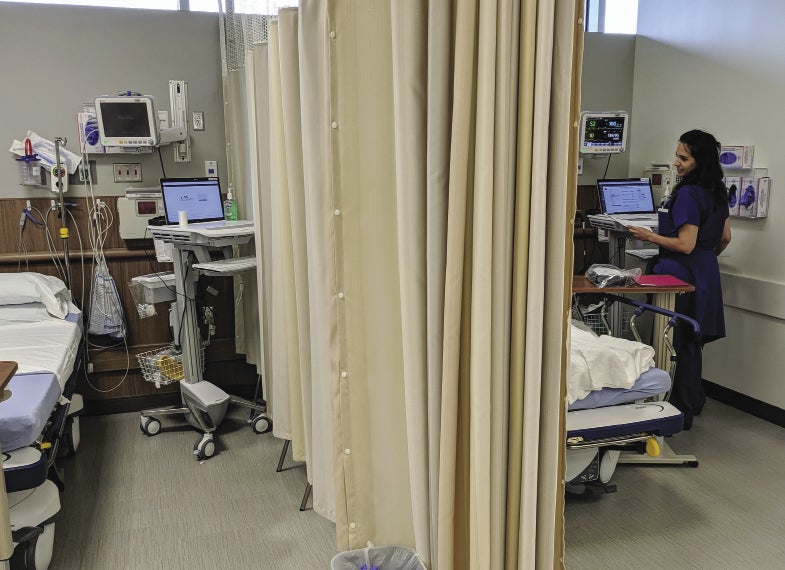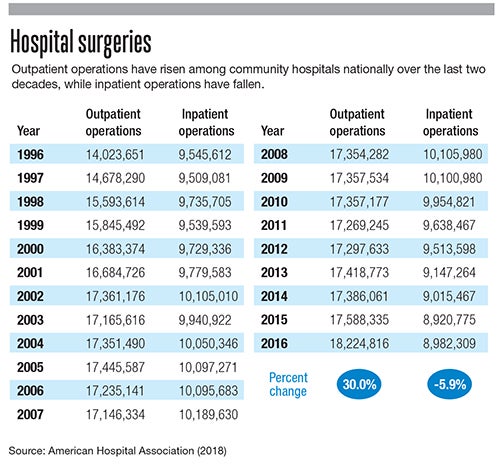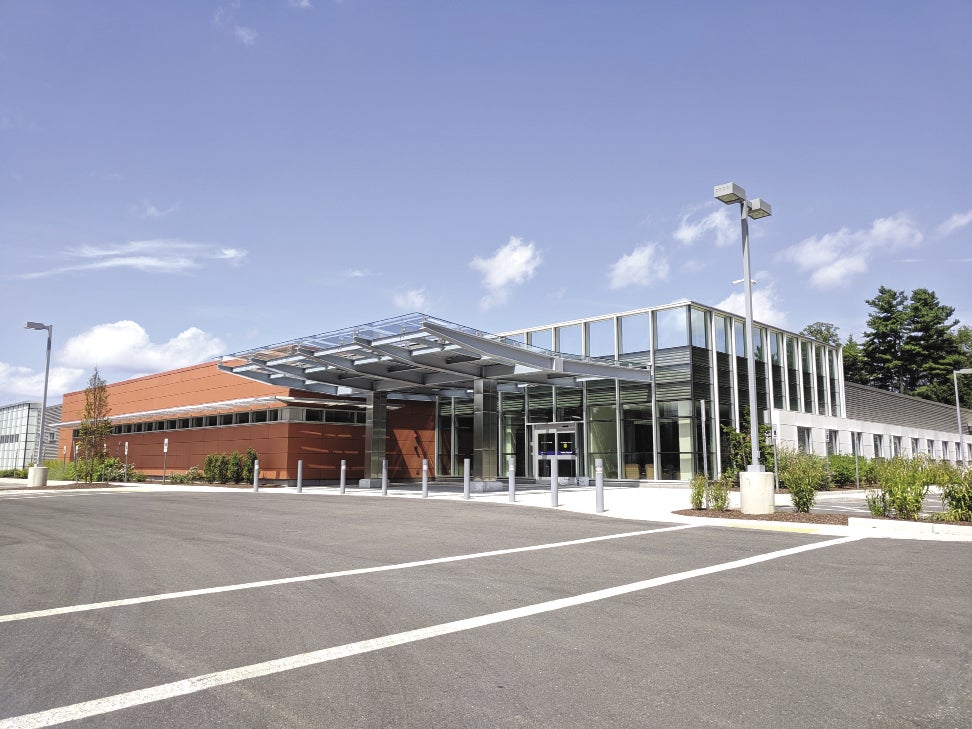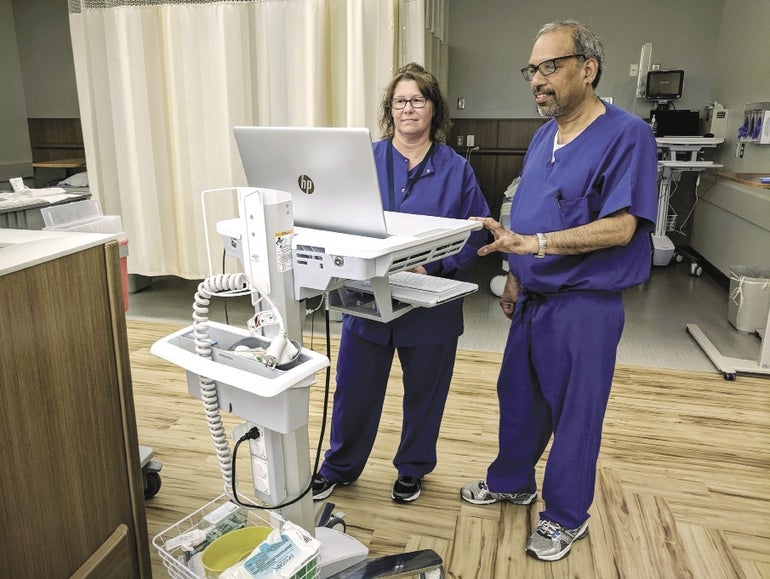Outpatient surgery centers benefit patients by having lower costs and avoiding a trip to a hospital campus – enough of a lure for health providers who otherwise could be seen as close competitors to join together to create one such center in Shrewsbury.
The Surgery Center, which opened last May, was the work of UMass Memorial Health Care and Reliant Medical Group, two Worcester organizations otherwise fighting one another to attract both patients and the providers who treat them. Joining them was Shields Health Care Group, and together, they provided more than 2,000 operations during the $31-million center’s first year.
The center has nine operating rooms and upwards of 20 surgeons on staff from both UMass and Reliant, with Shields providing management of the facility.
“It’s three great organizations that recognized a need for high quality but at a lower cost, outside the hospital setting,” said Prashanth Bala, the director of ambulatory surgery centers for Quincy-based Shields.

The three collaborators downplay the competition among them, and leaders from each of the three say the partnership makes sense because surgical advancements and the way insurers reimburse for operations make these so-called ambulatory surgery centers increasingly attractive.
Patients enjoy the center’s convenience, and surgeons like its specific focus only on certain operations, said Dr. Sudershan Singla, the center’s medical director of anesthesia services.
“The reason this became an obvious wonderful opportunity for all three entities is it satisfied what’s called the quadruple aim,” said Dr. Leon Josephs, the chief of specialties at Reliant, referring to high quality, low costs, and benefits for both patients and providers.
“So this made it easy,” Josephs said.
Growth aided by technology, cost
Advancements in surgical procedures and anesthesia have slowly made outpatient operations more common for the better part of the last three decades, starting with more relatively minor cases like tonsillectomies or hysterectomies.
Finances have played a role. Health insurers, based on government guidelines, reimburse differently if a procedure takes place on an inpatient or outpatient basis, making outpatient surgeries 40% to 50% cheaper, Bala said.
“It’s prescribed to be low-cost,” he said.
Costs were a major driver from the start for such ambulatory surgery centers – known in the industry as ASCs – according to David E. Williams, the president of the Boston consulting firm Health Business Group.

Physicians found the centers could be highly profitable to own and run, with higher-margin specialties like orthopedic and cardiac operations and patients who more likely carried private insurance, Williams said. Outpatient centers don’t have higher-cost burdens coming with keeping patients overnight or needing to be able to handle any type of medical need.
“They weren’t started for patient comfort and satisfaction,” Williams said.
In more recent years, ASCs have begun handling operations in sports medicine such as anterior cruciate ligament, or ACL, reconstruction. In some outpatient facilities, joint replacement surgeries are even taking place, something leaders at the Surgery Center in Shrewsbury expect will become more widespread.
Two-thirds of operations now take place on an outpatient basis, according to the American Hospital Association. At the same time, the number of national inpatient admissions has fallen since a decade ago, and outpatient hospital revenue – as low as 30% of overall revenue in 1995 – nearly matched inpatient revenue in 2017, according to the association’s latest data.
Nationally, more than 6,100 ambulatory surgery centers are now open, according to the Ireland market intelligence firm Research and Markets.
“Nationwide, the number of ASCs that have sprouted up is phenomenal,” said Dr. Thomas Breen, an orthopedic surgeon at UMass Memorial who works at the Surgery Center in Shrewsbury. “Because of the outpatient setting, it’s a much more pleasant experience for the patient. It’s not that big-hospital atmosphere.”
Growth in Central Mass. and elsewhere
More such surgical centers are likely on the horizon, locally and nationally, thanks in large part to an aging population whose procedures can more often take place away from a hospital campus.
Research and Markets projects a 16% increase in the number of procedures from 2016 to 2026.
Global Market Insights Inc. in Delaware, citing rising rates of cardiovascular, diabetes, arthritis and other health issues, is projecting revenue from such centers to rise from $70 billion in 2018 to around $95 billion by 2025.
Williams expects continuing growth, thanks to a series of trends: Patients looking for joint replacements at younger ages, when they’re generally in better shape to be operated on in an outpatient setting, and the popularity of such centers with both patients and physicians.
AARP, the Washington, D.C. group for older Americans, projects knee and hip replacements to grow by more than 170% by 2030. Between 2000 and 2014, the mean age of patients for hip replacement surgery fell from 66.3 years to 64.9, and the median age of knee replacement patients dropped from 68 years to 65.9, according to the group.

The industry publication Becker’s ASC Review has said it projects far more gynecology procedures to take place on an outpatient basis.
Massachusetts would seem to have plenty of room to grow in the number of ASCs, with 55 as of June 2018, according to the Ambulatory Surgery Center Association’s count of Medicare-certified centers. Maryland, which has a slightly smaller population, has 346, and many Southern states with fewer people also outnumber Massachusetts.
Reliant, which provides outpatient surgery at other centers, is planning with Shields an ambulatory surgery center slated to open next year in Natick. The Natick Surgery Center will offer surgical services including orthopedics, gynecology, urology, general and vascular surgery, and ear, nose and throat operations.
The $10-million Natick facility will be built in an existing office building at 313 Speen St. across from the Natick Mall, with three outpatient operating rooms, along with pre-operative, a post-anesthesia care unit and other spaces.
The Massachusetts Department of Public Health approved the center in June. A third partner in the Natick facility is ASC Holding Co., a firm representing community-based orthopedic specialty physicians.
In other cases, health providers have been shifting services to new areas.
Last winter, UMass Memorial opened a 120-bed mental health care facility, Hospital for Behavioral Medicine, in Worcester, replacing some beds that were located on hospital campuses. In April, MetroWest Medical Center opened an outpatient maternity care unit for labor assessment, lactation support and other services pre- and post-partum.

